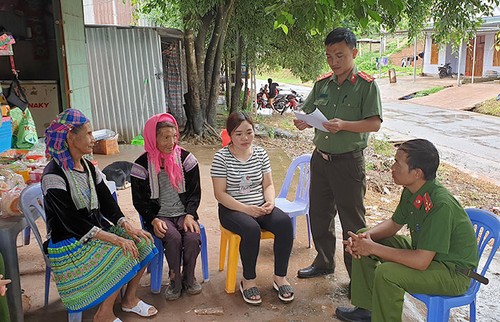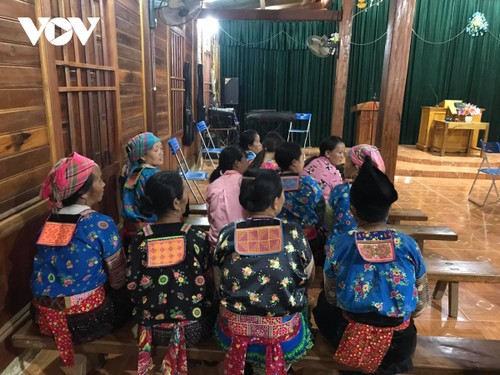|
 Muong Nhe district’s police force has increased communications for the locals to ensure public order. Muong Nhe district’s police force has increased communications for the locals to ensure public order.
(Photo: baodienbienphu.info.vn)
|
More than 90% of Muong Nhe residents belong to ethnic minorities. Poor living conditions and lack of education may have contributed to making some of the local Mong people receptive to two strange, heretical religions called "Gie Sua" and "Master Ruma".
These distorted forms of Protestantism, promoted by bad elements abroad and reactionaries in Vietnam, encouraged gullible followers to try to establish a separatist "Mong State".
A Mong man named Vang A Sinh in Huoi Khon hamlet 2 told VOV, “We understand that the ‘Gie Sua’ and ‘Master Ruma’ religions duped us, we won’t follow them. They only made our lives unstable.”
“It’s the government that has made our lives stable, so we should comply with state policies. We are encouraged to stay united, inform functional agencies if we see anyone breaking the law, and stop following heretical religions,” Vang A Sinh added.

A religious practice in Sima hamlet 2.
|
Muong Nhe administrators have publicized Party guidelines and State policies, especially the Law on Belief and Religion, throughout all hamlets and communes inhabited by ethnic minorities.
Special attention has been given to improving the qualifications of cadres engaged in religious work and state management of religions.
Meetings and dialogues have been held with religious followers and heads of religious groups.
Vui Van Nguyen, Chairman of the Muong Nhe People’s Committee, said, “People in 70 hamlets in Muong Nhe district are religious followers. There are 7 Protestant sects and one Catholic sect comprising nearly 3,500 households -- almost 21,000 people. 70 localities have registered their religious practices.”
According to Nguyen, the Committee has “sent officers to unregistered localities to learn about their situation and have asked them to report all religious activities in accordance with the law.”
”A few lawbreakers are still trying to recruit locals in an attempt to establish an independent Mong State, but we know who they are,” he said.
Religious practices in Muong Nhe now largely comply with the law. Religious groups have registered their activities with local authorities. The time, location, and content of religious activities during Christmas and other holidays conform to plans that are filed in advance with the administrations.
Nguyen Van Ky, Head of the Standing Office of the Government Steering Committee for Human Rights, said, “The Dien Bien police have been the main force helping people in Muong Nhe improve their living conditions, reduce poverty, and fight human trafficking. Human rights have been respected and protected, and now Muong Nhe is considered an outstanding example of respecting human rights in ethnic and religious matters.”
Religious groups instruct their followers to live a good life, respect God, love the nation, protect peace, practice charity, freedom and equality, and obey the law toward building great national unity.
Another Mong man named Giang Seo Toa in Muong Nhe hamlet 2 recalls, “I was taught by a pastor in Ho Chi Minh city, so I understand the religion and the state regulations on religious practices. I only carry out missionary work in permitted areas. I teach the 10 commandments of God. ‘Master Ruma’ is not God. God teaches us to love our parents, and share with each other. God is in our heart and encourages us to live well.”